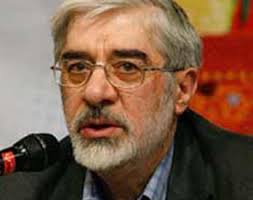 Since I'm up early and since I have no polling news to cheer about here in Virginia (hopefully SurveyUSA will change that later today), I'm going to turn my attention for the moment to a far more important election - Iran's presidential showdown between Holocaust denier/hardliner/lunatic Mahmoud Ahmadinejad and "reformist" former Prime Minister Mir Hossein Mousavi, to be held this Friday. Check this out:
Since I'm up early and since I have no polling news to cheer about here in Virginia (hopefully SurveyUSA will change that later today), I'm going to turn my attention for the moment to a far more important election - Iran's presidential showdown between Holocaust denier/hardliner/lunatic Mahmoud Ahmadinejad and "reformist" former Prime Minister Mir Hossein Mousavi, to be held this Friday. Check this out:The leading candidates are accusing each other of corruption, bribery and torture. The wife of the strongest challenger to President Mahmoud Ahmadinejad has threatened to sue him for defaming her. And every night, parts of the capital become a screaming, honking bacchanal, with thousands of young men dancing and brawling in the streets until dawn.A few thoughts.
[...]
In part, that appears to be because of a surge of energy in the campaign of Mir Hussein Moussavi, a reformist who is the leading contender to defeat Mr. Ahmadinejad in the election, set for Friday. Rallies for Mr. Moussavi have drawn tens of thousands of people in recent days, and a new unofficial poll suggests his support has markedly increased, with 54 percent of respondents saying they would vote for him compared with 39 percent for Mr. Ahmadinejad.
But many Iranians say the campaign’s raucous tone is due largely to Mr. Ahmadinejad’s unexpectedly fierce rhetorical attacks, which have infuriated his rivals and their supporters, and drawn some blistering ripostes.
1. You thought our elections were rough and tumble? We're a bunch of boring old fogies compared to the "screaming, honking bacchanal" of Iran. :)
2. I'm well aware that most of the power in Iran's government lies elsewhere - with the Supreme Leader (Ali Khamenei), the Guardian Council, the Expediency Council, the Revolutionary Guards, and Parliament - but I still believe this election is important, certainly for Iranians themselves but also for U.S.-Iran relations and for the prospects of a dialogue between our two nations. Mahmoud Ahmedinejad has certainly not made President Obama's life any easier, which is one reason I am rooting big-time for Mir Hussein Moussavi on Friday, as a potential negotiating partner for Barack Obama (who, by the way, has now passed the "3AM test" according to Hillary Clinton).
3. According to Stratfor, "We need to be on the lookout for any signs that the establishment has decided to abandon the incumbent." That's partly why this election is important, perhaps even crucially important, as a sign of whether Iran has decided to fundamentally change course, either in terms of domestic/economic policies or in its foreign policy.
4. The last time a reformist won the presidency of Iran was in 1997. Not coincidentally, oil prices (and Iran's oil revenues) were very low at that time. Today, although oil prices and revenues are much higher than they were in 1997 in nominal terms, they're actually not that great in "real" (inflation adjusted), per capita terms. Also, prices have fallen from around $120 per barrel in June 2008 to about half that today. That's made it much harder for hardliners like Ahmedinejad to lavish huge amounts of cash on people (in the form of subsidies, for instance) to essentially buy them off. In addition, as The Economist writes, "a worsening economic outlook may damage [Ahmedinejad's] prospects," with "criticism of [his] economic management" potentially causing "rifts within the hierarchy." Let's hope so.
5. With a population of more than 72 million - more than Saudi Arabia (28 million) Iraq (31 million), the United Arab Emirates (5 million), Kuwait (3 million), Bahrain (under 1 million) and Qatar (1.5 million) combined - plus huge oil and natural gas reserves and a nearly 1-million-strong military force, Iran is by far the largest country and greatest potential power in the Persian Gulf region. The country is also developing a nuclear program, certainly for energy and almost certainly for the potential (at least) of building nuclear weapons. Finally, Iran is the leading Shi'ite Muslim nation in the world. Bottom line: this country is important.
For all of these reasons, I'll be watching Iran's elections later this week very closely. How about you?
P.S. In other news, Lebanon held parliamentary elections yesterday, with the governing pro-Western coalition claiming victory over a Hezbollah-led bloc. Also, click here for intelligent blog analysis of British Prime Minister Gordon Brown's political problems.

